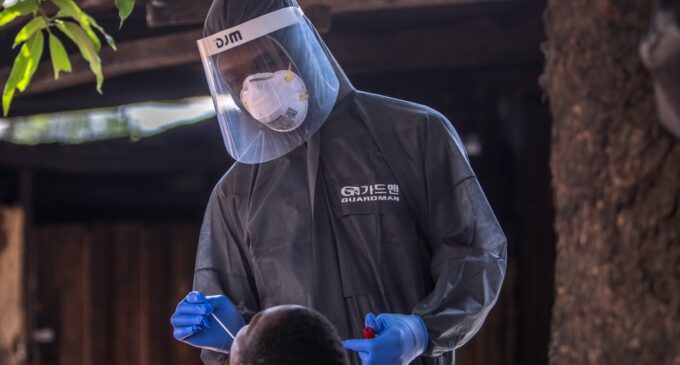10 tips for surviving 2021

Just about the time the imprudent fireworks rent the sorry Nigerian skies to mark the dawn of 2021, a friend called seeking assistance for her critically sick relative who had just tested positive for COVID-19 and desperately wanted to get admitted at one of the treatment centres. As I worked the phone, my family stood watching and waiting for us to conduct the traditional New Year crossover prayers. And there in lies the conundrum represented by the celebrations going on around the world by those of us who have managed to escape the wrath of the unforgettable 2020-joy in the midst of sadness.
Annus Horribilis is probably the best description of 2020, a year that has seen the world disrupted as much as, if not more than, the World War (II) and the Influenza or Spanish Flu did. Over a million precious lives have been lost and several millions of livelihoods wiped out by the Coronavirus pandemic. And from all indications, there’s yet no end in sight. If the saying that the more things change the more they remain the same is anything to go by, then 2021 is not going to be any better than 2020.
Let’s be honest, 2021 could very well be worse than 2020 and I will tell you why presently. Firstly, against every known health and safety advice, most Nigerians went all out to celebrate the Christmas, traveling to various parts of the country and attending various events without observing the COVID-19 protocol. Secondly, and as a corollary to the above, despite the economic downturn, most Nigerians spent so much money on Christmas celebrations. The sheer volume of fireworks costing billions of Naira wasted on a needless crossover night is the most unfortunate. In Lagos, the shelves in most liquor stores were emptied. So, I foresee a spike in COVID-19 infections as well as a spike in the number of people falling into poverty in the New Year having exposed themselves and overstretched their already dwindling resources.
So, it is basically escapist for people to wish that 2020 would end, so 2021 could start. Who said 2021 would be better? Whoever even predicted that 2020 would be what it was? Forget the prophets, please! And what have we done to make 2021 better? The answers to these questions scare the hell out of me, and should equally frighten every sensible human being. Suffice it to say that COVID-19 and all our other problems wouldn’t disappear just because the clock chimed 12 midnight to usher in a new year. No way! COVID-19 also crossed over to 2021. In actual fact, it will get even worse before it gets better.
By the way, we must not forget that the COVID-19 pandemic and its knock-on effects are not the only worries the average Nigerian has as of today, January 1, 2021. We are still plagued by an all-time high level of insecurity marked by commercial kidnapping, armed robbery and other violent crimes. We are also faced with dwindling national resources owing to flagging price of crude oil, Nigeria’s major revenue earner. Perhaps, one should recognise the presence and impact of conspiracy theories, which are fast becoming a part of our culture, no thanks to the democratisation of telecommunications, the internet and social media. All these and more in addition to COVID-19, unfortunately, will remain the major defining factors of life in 2021.
So, how do we survive in 2021, granted, and we must accept the fact that, this year, we will be compelled to still live in the new normal? I have some ideas. They are not born out of any special art or rocket science, but everyday street experience. Let me be brutally frank with you, and this is not meant to spoil your fun or burst your bubble, your night vigil or prayers or WhatsApp messages are not likely to mitigate the health, social and economic challenges we will experience in 2021. At best, it will mitigate the pains we are likely to feel. In short, it will inoculate us or opiate us from the psychological effects of what we are about to witness or experience. To be on the “safe” side, here are the 10 cautious steps I believe we can all take to manage through 2021.
1. Be more health and safety conscious: 2021 is not yet the post-pandemic era. The Coronavirus is still very much here and mutating, as we have learnt, in the UK, US and even Nigeria. We must remain ever vigilant and very careful. The best strategy is to see everyone outside your immediate family (home) as Covid-positive until otherwise proven. Therefore, you must wear an appropriate face mask appropriately, wash your hands regularly or use the right sanitisers, and watch your distance. Do NOT leave your home, except and unless it is absolutely necessary.
2. Be More Financially Prudent: Aside the telcos and the banks, every other sector of the economy, needless to name them one by one, has been “snookered” by the pandemic. Perhaps, the informal sector, driven largely by SMEs, have all but died. As a part-time tailor, I have not received orders for more than 20 clothes since April. The factory is mostly shut and the young people who were making a living by making the clothes have had to stay home. This is just one business. So, let’s all be prudent if not frugal in our expenditures this year. Spend only on what is absolutely necessary.
3. Keep some cash for medicals: In a country where public healthcare infrastructure is nothing to write home compared to what obtains in the developed world, it would be suicidal or murderous not to have “something kept aside” for medical emergencies. Aside medical emergencies, we must now develop the habit or culture of keeping a healthy First Aid Box at home with basic OTC (Over The Counter) medicines. These would come in handy when family members feel mildly sick and doesn’t need to see a doctor.
4. Develop healthy habits: The saying “health is wealth” could not have been any truer than now. Aside forming the habit of exercising your mind and body regularly, you should be more careful of what you eat. This is especially so for those who working from home and do not move around frequently during the day. There is a report which suggests a rise in cases of Hypertension, Diabetes and even unwanted pregnancies all associated with idleness, in a manner of speaking.
5. Spend quality time with your family: 2020 has taught us that family could be everything, at the end of the day. We were compelled to spend more time at home willy-nilly with our families. There wasn’t enough room to hang out with friends, colleagues, associates and business partners while we were stuck at home. For some, who were almost always on the go travelling and attending meetings, business and social engagements, the pandemic and the accompanying lockdown were god-sent. In 2021, it would be more of less the same, until we all get inoculated with the COVID-19 vaccine. So, we should strive to take advantage of the opportunity to improve our relationships with our spouses, children, parents and siblings. Do whatever it takes – like praying , watching movies together, playing games, cooking, singing, dancing, walking, jogging and dining together. Wouldn’t it be such a waste of precious time to come out of this pandemic with a more fractured family? And that is possible with our over-reliance on social media.
6. Learn some domestic skills: The human being is capable of several things and the possibilities are limitless. Nothing says a woman (or the wife) must always cook for the house. The husband can also cook. The kids too. And if they do not know how to cook, this is a good opportunity to learn some cooking skills. There are several other skills. For example, some of the little breakdowns in the house for which we pay an artisan to fix could actually be handled by us. How about learning how to fix some of these things –and it could be as easy as reading the manuals! And you will be saving a few bucks and also limit the people who gain access to your house during the pandemic.
7. Read, write and confer more: According to Sir Francis Bacon, “reading maketh a full man, conference a ready man and writing an exact man.” For those who are so inclined, we sure do have a lot of time on our hands to read some books we’ve kept on the shelves and write the books or essays we always wanted to write. The way to start is to start. Make a timetable for all you do and include the time for reading and writing. You can also include time for conferences. By conferences, I don’t mean attending physical conference, as you would imagine, but there are several online opportunities we can take advantage of to improve ourselves. Aside these formal platforms, there are certainly some social groups, Facebook and WhatsApp for example, where diverse issues are regularly debated by people of different social, political and economic persuasions. There’s so much to learn from some of these groups and conversations, but please avoid the unhelpful altercations.
8. Learn to think of others: These are indeed trying times and the trials and tribulations are not going away anytime soon. Of course, the poor will always be amongst us, as the Holy Bible say, but so many livelihoods and lives have been ruined leading to an increased army of destitute or borderline destitute. If you are more privileged, try and reach out to your friends and relatives and neighbours who may be less privileged. You could be saving a life (or lives) by sending some cash or kind. It could even be food stuff (aka palliative) or airtime to enable a friend stay online! Try. Do it. Just do it. It is good in times of adversity for the haves to lend their shoulders to the have-nots to lean on or else the rich could be the only meal left for the poor to eat.
9. Have a plan: Regardless of the uncertainties, everyone should make and keep a plan. We should not allow ourselves to swung around on the pendulum of socio-economic challenges caused by the pandemic. Necessity, they say, is the mother of invention. Most of the breakthrough innovations were born out of challenging situations. Pfizer, Mordena, AstraZeneca and other pharmaceutical companies, for example, were compelled by COVID-19 to produce vaccines in world record times. Many restauranteurs have changed their model to Drive-Through and Home-Delivery owing to the lockdown imposed by governments. The pandemic notwithstanding, we must think harder and plan our lives just in case opportunities arise in-between. The US got 56 new billionaires since the pandemic started, interestingly. And who says COVID-19 won’t go away?
10. Prepare to take the vaccine: The world will eventually get to a point where travels (local and international) and other social interactions will be predicated on the presentation of a COVID-19 vaccination card. There’s been a strong anti-vaccine lobby led by conspiracy theorists and some religious leaders leading to hesitancy. Africans, for obvious reasons, will not be amongst the first to have access to the vaccines and vaccination. However, when it does come, because it will eventually come, prepare your mind to get vaccinated to not only protect yourself from being infected but to inoculate yourself from the restrictions that will follow for those without it.
At the end of the day, the Coronavirus pandemic will, like the Spanish Flu, not be with us forever. Once the vaccine gets to everyone and a cure is found, that will be it. But until such and such a time, we must remain eternally vigilant and responsible. 2021 will be the year to test our ability to bounce back. We must be prepared, and I hope the aforementioned tips will help us do so.
Emeka Oparah writes from Lagos
Views expressed by contributors are strictly personal and not of TheCable.













This is really helpful, thank you.